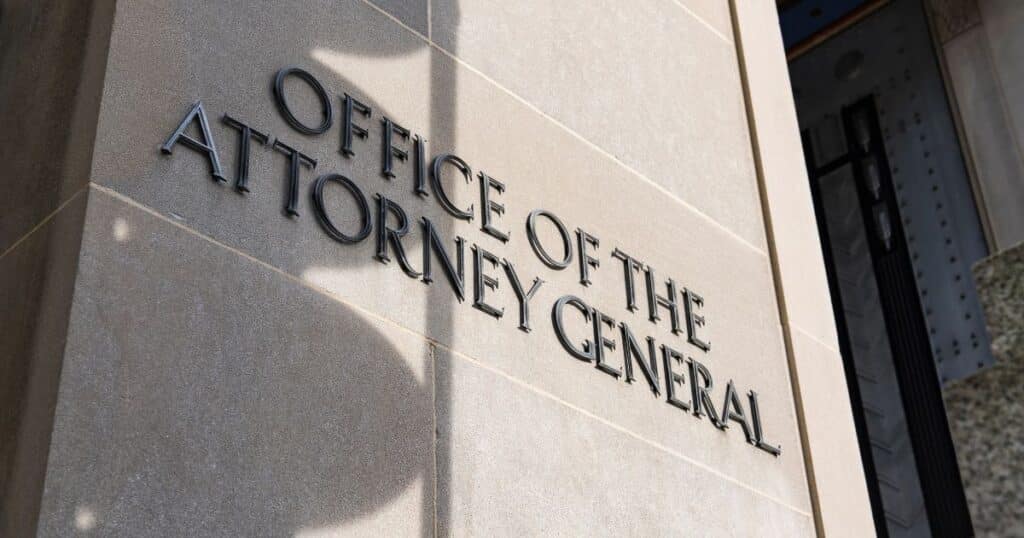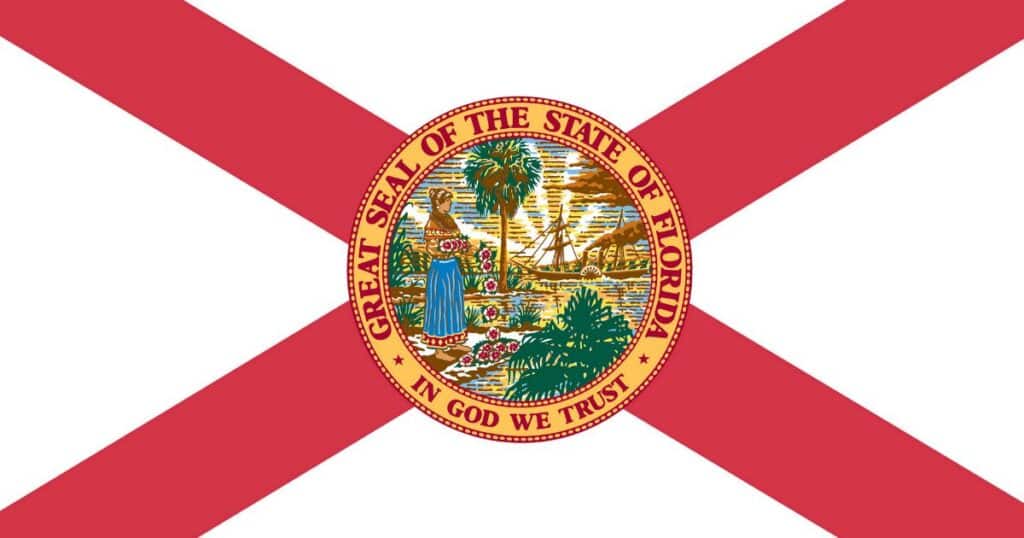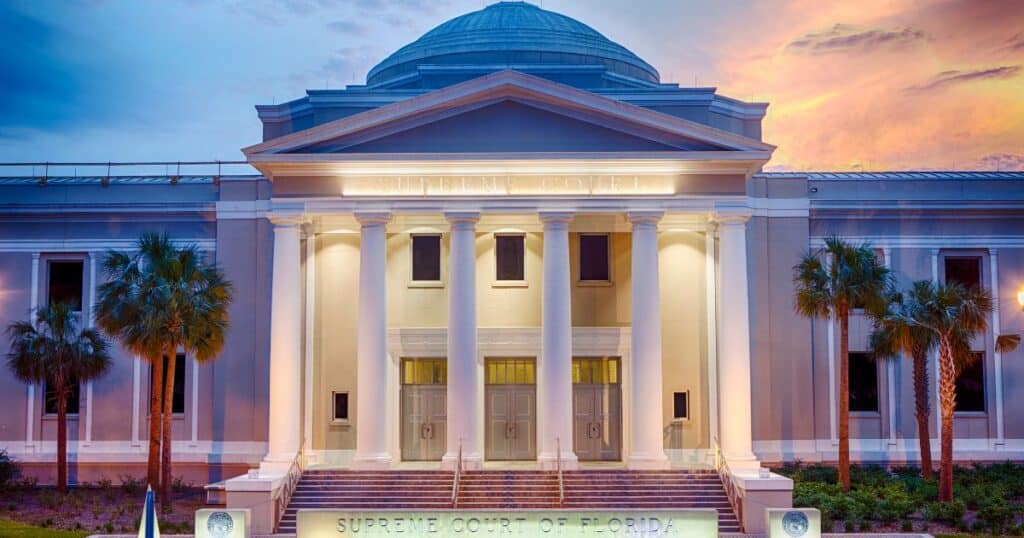The state of Florida is currently contemplating a proposal to legalize adult recreational use of marijuana. The proposed Amendment would expand on the current medical-marijuana language in the state, which gives the Department of Health oversight of the state’s marijuana industry.
Smart & Safe Florida, a political committee primarily funded by the medical-marijuana company Trulieve, is backing the proposed Amendment. The group argues that it would bring “sensible marijuana policy to Florida.”
However, Florida Attorney General Ashley Moody has recently asked the Supreme Court to remove this bill from consideration for her own reasons. She outlines her four arguments in an amicus brief filed with the court.

Argument 1: Federal Illegality of Recreational Marijuana
Moody’s first argument is that even if the Amendment passes, recreational marijuana would still be federally illegal. She cites this as a reason why the Amendment should not be allowed to go on the ballot for voters to decide upon. As she puts it in her brief:
“The Adult Personal Use of Marijuana ballot summary instructs voters that the proposed amendment would allow adults 21 years or older to possess, purchase, or use marijuana.” But marijuana is independently prohibited by federal law. Indeed, every individual who possesses marijuana under the scheme provided by the proposed Amendment would become a federal crime.
The little the summary does say about federal law is inadequate to dispel the misimpression created by the word “allows” and instead suggests that at least some subset of marijuana use in Florida would be lawful under federal law. Because the proposed amendment “will not deliver to the voters of Florida what says it will,” the Court should strike it from the ballot.
Argument 2: Misleading Summary About “Other State-Licensed Entities”
Moody’s second argument is that the ballot summary misleadingly suggests that it would authorize “other state licensed entities” beyond Medical Marijuana Treatment Centers (MMTCs) to cultivate and distribute marijuana.
She claims this gives a false impression of what the Amendment would actually do, as it does not mention anything about regulating these entities or providing any oversight for them. Instead, she believes, MMTCs would remain unregulated under the proposed Amendment, yet voters are being misled to think otherwise. As she puts it in her brief:
“The ballot summary is misleading in its discussion of the entities that the Amendment would license to engage in the marijuana trade in Florida. The proposed Amendment states a truism about the Legislature’s already-existing authority to empower more businesses to enter the marijuana market, specifying that “the legislature may provide for the licensure of entities that are not Medical Marijuana Treatment Centers to acquire, cultivate, possess, process, transfer, transport, sell, and distribute marijuana products and marijuana accessories for personal use by adults.”
But the proposed Amendment does not itself authorize any existing or new licensed entities or require the Legislature to provide for additional licensure. The ballot summary, however, suggests that the Amendment would “allow Medical Marijuana Treatment Centers, and other state licensed entities, to acquire, cultivate, process, manufacture, sell, and distribute” marijuana. The Amendment itself “allows” no such thing—it merely declines to disturb the Legislature’s preexisting authority to license additional such entities.
Argument 3: Misleading Summary about Possession Limits
Moody’s third argument is that the ballot summary misleadingly suggests that the amendment “limits” the scope of immunity for possession when it actually outright bans possession of more than 3 ounces. She claims this gives a false impression, as it makes it seem like there would be some protection from prosecution for those who possess more than 3 ounces when there would not be, and argues that this would ban homegrown effectively. As she puts it in her brief:

The ballot summary also misleads voters with respect to the Amendment’s ban on possessing certain quantities of marijuana. The text of the adult-use Amendment would provide that “an individual’s possession of marijuana for personal use shall not exceed 3.0 ounces of marijuana except that not more than five grams of marijuana may be in the form of concentrate.”
That does not simply cap the scope of the immunity created by the Amendment; it affirmatively outlaws the possession of more than 3 ounces of marijuana. As a result, the Legislature under the Amendment would have no power to permit Floridians to possess more than 3 ounces of marijuana, with the practical effect that the proposed Amendment bans all or most marijuana home cultivation by individuals.
Argument 4: Fails to Provide Regulatory Oversight by DOH
The fourth and final argument Moody makes is that the ballot summary needs to advise voters that the Amendment would leave MMTCs unregulated. She believes this is a crucial point to consider, as she thinks it is important for voters to be aware of how the recreational marijuana industry in Florida will be regulated before deciding whether to approve it. As she puts it in her brief:
The summary is deficient in one final respect. Existing Article X, Section 29 grants the Department of Health the authority—indeed, the “duty”—to “issue reasonable regulations necessary for the implementation and enforcement of this section.” ‘The purpose of the regulations,” the Amendment continues, “is to ensure the availability and safe use of medical marijuana by qualifying patients.” Though the proposed Amendment would expand Article X, Section 29 to cover recreational uses of marijuana, it would not extend the Department’s regulatory authority over that use.
At best, the proposed Amendment is ambiguous about the Department’s regulatory authority in that new area; at worst, the Department would lack any such authority. Nor would the Amendment grant any other regulatory agency authority to oversee MMTCs in their recreational businesses.
Yet the summary says nothing of this. If anything, its reference to “other state licensed entities” suggests that the Department would possess recreational regulatory authority comparable to its authority to regulate the medical marijuana market. Entities that are “licensed,” after all, are also typically regulated by the licensing agency. Thus, voters familiar with existing Article X, Section 29 (and even those who are not) would assume that the proposed Amendment would extend the Department’s regulatory authority to recreational marijuana—which it does not.
But even assuming the proposed Amendment would permit the Department to regulate the recreational marijuana industry, the summary fails to tell voters that the industry would necessarily be unregulated for at least some substantial period. Because the Amendment would not require legislative or regulatory implementation of its new provisions at all, let alone by any particular date, the effect of the Amendment would be to allow MMTCs to cultivate, process, and distribute recreational marijuana with no guarantee of regulatory oversight.
Supporters and Opponents of the Amendment Respond
The Attorney General’s brief has sparked a debate among supporters and opponents of the Amendment. Supporters have argued that Moody’s concerns are baseless, as they believe that voters should be able to interpret the ballot summary on their own and make an informed decision.
Smart & Safe Florida spokesman Steve Vancore said the company disagrees with Moody’s analysis.
“We believe the language as written clearly complies with the requirements of the Constitution. We look forward to bringing this matter to the Florida Supreme Court and are confident that the court will conclude that there is no lawful basis to set aside the ballot initiative. This important issue should be entrusted to the citizens of Florida — over a million of whom have already signed the Smart & Safe Florida petition saying they support it — to decide for themselves through democratic choice,” Vancore said.
On the other hand, opponents of the Amendment have argued that Moody’s arguments are valid, citing the current federal legality of cannabis.
Ultimately, it will be up to the Supreme Court to decide whether or not Florida Attorney General Ashley Moody’s challenge is valid. The court could decide whether or not the Adult Use Bill should remain on the ballot for voters in November or if it should be removed altogether.
Enjoyed that first hit? Come chill with us every week at the Friday Sesh for a freshly packed bowl of the week’s best cannabis news!















